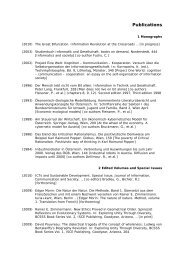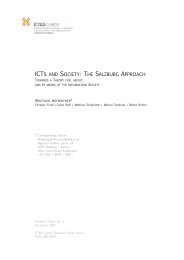CHRISTIAN FUCHS - ICT&S - Universität Salzburg
CHRISTIAN FUCHS - ICT&S - Universität Salzburg
CHRISTIAN FUCHS - ICT&S - Universität Salzburg
Create successful ePaper yourself
Turn your PDF publications into a flip-book with our unique Google optimized e-Paper software.
Christian Fuchs: Social Networking Sites and the Surveillance Societypossibilities and perspectives for organizing critical discourse in a society that iseconomically and politically stratified, i.e. shaped by economic and political powerdifferentials. Nonetheless, the only way to bring about change is to try to organizecollective articulations of discontent with certain situations.Our second recommendation is that critical citizens, critical citizens’ initiatives,consumer groups, social movement groups, critical scholars, unions, data protectionspecialists/groups, consumer protection specialists/groups, critical politicians, criticalpolitical parties observe closely the relationship of surveillance and corporations anddocument instances where corporations and politicians take measures that threatenprivacy or increase the surveillance of citizens. Such documentation is most effective ifit is easily accessible to the public. The Internet provides means for documenting suchbehaviour. It can help to watch the watchers and to raise public awareness. In recentyears, corporate watchdog organizations that run online watch platforms have emerged.There are limitations to such projects, such as resource precariousness and anantagonism between resource precariousness and political autonomy.There are no easy solutions to the problem of civil rights limitations due to electronicsurveillance. Opting out of existing advertising options is not a solution to the problemof economic and political surveillance. Even if users opt out, media corporations willcontinue to collect and assess certain data on them, to sell the users as audiencecommodity to advertising clients, and to give personal data to the police. To try toadvance critical awareness and to surveil corporate and political surveillers areimportant political moves for guaranteeing civil rights, but they will ultimately fail ifthey do not recognize that electronic surveillance is not a technological issue that canbe solved by technological means or by different individual behaviours, but only bybringing about changes of society. Therefore our fourth recommendation is to situatethe topic of electronic surveillance in the context of larger societal problems in publicdiscourse.Our fifth recommendation is to create non-commercial, non-profit social networkingplatforms on the Internet. It is not impossible to create successful non-profit Internetplatforms, as the example of Wikipedia, which is advertising-free, has free access, andis financed by donations, shows. But the difficulty is that social networking platformshave to store large amount of data, especially profile data that contain images, videos,etc, which requires tremendous server capacities. It is certainly easier and probablymore efficient to organize such huge data storage endeavours in the form of profitorientedbusinesses. But this orientation at the same time brings about the risk ofextended and intensified electronic surveillance. We are not saying that noncommercial,non-profit platforms are devoid of this risk, but that there is a reducedlikelihood that electronic surveillance for economic reasons will take place on suchplatforms and an increased likelihood that such platforms will try to protect its usersfrom state surveillance. Within capitalism, it is certainly very difficult to try to organizesuch non-profit online alternatives because everything that is non-profit and noncommercialtends to be confronted by shortages of resources, which makes sustainableperformance difficult. Trying to organize alternatives might be precarious, difficult, andconfronted with a high probability of potential failure. But the same time it might be theonly constructive alternative to corporate control and corporate concentrationprocesses in the Internet economy that tend to reinforce processes of economic and116









